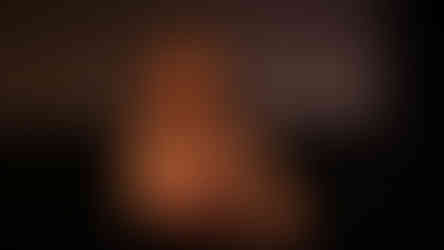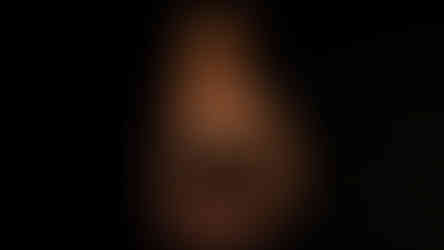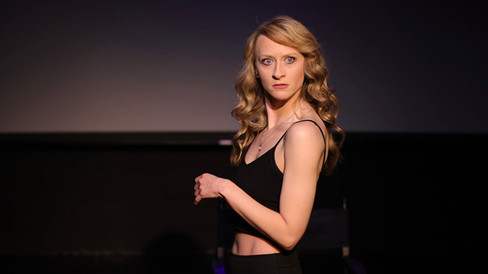Meet Rheagan Wallace—Creator and Star of STAGE MAMMA: From Child Star to Leading Lady
- Elizabeth Gracen

- Aug 28, 2025
- 10 min read
By Elizabeth Gracen:

If you had roughly one hour to tell your life story, how would you do it? Would it even be possible to condense the high and lows of your life in a way that would move people to tears one moment and have them laughing out loud the next? Would you be brave enough to step out on a stage all by yourself to tell it?
With an inspiring production, both emotionally raw and wildly entertaining, Rheagan Wallace has done just that with her one woman show, Stage Mamma: From Child Star to Leading Lady. In a world premier at the Hollywood Fringe Festival this summer, Wallace commanded the Zephyr Theatre stage, channeling a myriad of characters and emotions, weaving a complex, deeply personal tale about the life of a child actor and her fraught relationship with an overbearing and exacting stage mother.
Wallace, an actor, writer, filmmaker, and comedian, is a force to be reckoned with. A powerhouse of determination and skill, she unflinchingly dares to "truth-tell" and uncover the intricate connections between her own ambition, passions, and the deep wounds that permeate generational trauma. To say that Stage Mamma packs a lot into one hour would be an understatement. The effective use of documentary footage and clips from a long career punctuate the story as Wallace literally does not stop moving, pulling us ever closer to the heart of the matter, leaving the audience breathless from the whirlwind performance, pondering our own connections with family and what motivates our lives.
Flapper Press is all about highlighting and supporting artists, and I was so impressed with Rheagan's work that I had to reach out to talk about the production, her career, and her art.
Please meet the one and only Rheagan Wallace!

EG: Rheagan, first of all, congrats on such a powerful show! I had the good fortune to see Stage Mamma: From Child Start to Leading Lady this summer in Hollywood, and I was blown away watching your raw, honest, powerhouse performance. Your ability to synthesize your career and the complex dynamic you had with your mother was electrifying. Can you tell our readers a little bit about the play and why you wrote it?
RW: Thank you so much. I’m really touched to hear that you were moved by Stage Mamma. The show is essentially about my life with my “stage mom,” growing up as a child actor in the trenches of Hollywood. At its heart, it’s about my relationship with my mother—my biggest supporter and my greatest challenge. It’s very much about how multiple, conflicting things can all be true at the same time, and I wrote it because I’m still learning how to hold space for all of those truths.
A big part of why I wrote it was to explore generational trauma—especially for women—and what it means to be a cycle breaker. My mother carried pain and beliefs shaped by her own upbringing and, in many ways, I inherited them. But I’ve also worked hard to find healing, to disrupt those patterns, and to choose a different way forward for myself and my daughter.
After my mom passed away last year, the story I’d always believed about myself started to look very different. I took on the project of digitizing over 180 hours of 8mm footage of my life—starting from the day I was born—and I was blown away by that whole process. I knew I came from a lot of love, but seeing it so clearly was overwhelming.
I knew I wanted to do something with all of that beautiful footage. At first, I thought I was editing a documentary about my life. But one day, during a very weepy therapy session, my therapist suggested, “Maybe you should try a solo show.” It was an immediate light bulb moment. I knew instantly—that’s exactly what I wanted to do.
I also wrote it because art prevails in the darkest times. The world needs as much truth-telling and art as we can put out there right now. Art can shift perspectives, open hearts, and create empathy—and in this climate, that is a form of activism. Stories change lives. If my story can make even one person feel seen, heard, or inspired to tell their own truth, then I’ve done my job.
EG: I was an actress in Hollywood for a long time, so I immediately identified with your struggles and triumphs as a professional in the crazy business of show. However, I started my career as an adult, and you started as a child. That is a whole other ball of wax. I’ve seen your show, so I’ve heard your origin story and what followed, but I would love for you to talk about what it was like to begin a career at such a young age. If you had it to do all over again, would you? What, if anything, would you do differently?
RW: This is very much one of those “multiple truths at once” things I explore in the show. I’m genuinely happy with where I am now, so I wouldn’t change the path that got me here. My childhood was unconventional, but I loved it. I never wanted a so‐called “normal” childhood or to go to a regular school. I thrived in the alternative, creative lifestyle we lived.
If I could change one thing, it wouldn’t be the work—it would be the deeper context my mom and I were operating in. I wish my mom could have found healing for the trauma she had internalized and that society hadn’t inflicted such deep wounds on her—and on her mother—that they both carried forward. So much of what shaped our relationship wasn’t just personal, it was generational.
I also wish Hollywood, and the culture at large, didn’t uphold such toxic ideals for women—the constant message that we have an “expiration date,” that our bodies are never good enough, that our worth is tied to our appearance or our weight. My mom internalized those beliefs long before I was born, and the industry only reinforced them.
The entertainment business is the only industry where kids get work permits so they can go to work—and yes, it’s fun, but it’s also work. Auditions are exhausting. The rejection and pressure are intense, even for adults. I believe you can guide a child through those realities in a healthy way, but it takes an incredibly grounded, self‐aware adult to do it well.
Being a child actor can be joyful and rewarding, but it’s also a demanding job for everyone involved—sometimes especially hard if you never actually book the job. I’d gladly do it all again, because the root of my struggles with my mom had less to do with Hollywood itself and more to do with the generational wounds and toxic ideals that neither of us created but both of us were navigating. If she had been able to heal from that—and if the culture around us had been healthier—I think she would have been even stronger in navigating both the industry and life in general for the both of us.
EG: Let’s talk a bit about your mom and the huge influence she had on your life. When I think of a stage mother, my mind goes to Mamma Rose in Gypsy. Tell me about your mother and how your relationship with her has made you the person you are and the performer you are. How have you learned to reconcile the darker aspects of your relationship with her with the love you feel for her? Do you see any parallels with your mom and Mamma Rose?
RW: I totally get the comparison! My mom loved Gypsy! She was fiercely ambitious for me and boldly strategic. Like Mama Rose, her love was tangled up with her own need for purpose, identity, and recognition. Both could charm anyone and make things happen—but that drive sometimes came at a cost.
There were periods in my adult life when I went no contact with my mom. At times, she treated me more like a performer than a child, and the pressure to meet expectations was overwhelming. I often felt responsible for her happiness and questioned whether I was loved for who I truly was—or just for what I could achieve. There was emotional manipulation, blurred boundaries, and a constant sense that my identity was being shaped and controlled by someone else.
Eventually, I had to step away to figure out who I was outside of her influence. With time, distance, and therapy, I was able to work through the guilt of needing that separation, as well as the anger I carried toward her. I began to see her differently—not just as my mother but as a character in her own life story. I approached her the way I would approach a role I was preparing to play: breaking down her history, her motivations, her pain.
I didn’t excuse her behavior, but I began to understand it. Her love—complicated, consuming, and imperfect—was also deeply real. She truly believed in my gift and wanted me to live a full, creative, extraordinary life. It just took me a long time to untangle that truth.
Stage Mamma is my way of exploring that complexity. Sometimes the greatest gift a person can give is believing in someone before they believe in themselves.
Rheagan Wallace in Stage Mamma: From Child Star to Leading Lady
EG: When I watched your performance at the Zephyr Theatre, I was immediately caught up in the tight web you weave, pulling the audience in to what it’s like to participate in the Hollywood machine. You really don’t hold anything back, and it’s so refreshing to watch. What were the biggest challenges in putting this show together? Tell me about your partners who helped you bring this play to life.
RW: I think my biggest challenge was shaping a lifetime of stories into a single hour. My instinct was to include everything, but I quickly realized the real power was in what I chose to leave out—so the heart of the story could truly land.
I couldn’t have done it without my creative partners. My director, Jessica Lynn Johnson, was my rock. She guided me through every stage of development, helping me trim the fat while holding on to the emotional truth. I would have been lost without her. Heather Dowling was instrumental in shaping the physicality of the show and the way my characters flow from one to another. I had never performed a scene with myself before stepping into Heather’s “character gym,” but once she walked me through the dynamics of solo theatre, something just clicked. I realized I was falling in love with the craft itself—and that comfort came entirely from the support and guidance of Jessica and Heather.
My family was endlessly understanding of my bizarre writing hours, and my sweet, patient husband, Eric Moore, rehearsed the show with me countless times in our living room once the script was locked. Mary Lou Sandler—who not only designed my poster but also filmed my show—brought such artistry to the visual side of Stage Mamma.
It truly took a village to bring my life to the stage, and I’m deeply grateful for every single person who believed in this project from the very beginning.
Rheagan Wallace in Stage Mamma: From Child Star to Leading Lady
EG: Someone once told me that everyone has two businesses—their own business . . . and show business. You’re from Texas—a world far removed from Tinsel Town. If you could tell the people from your hometown about what it’s been like to be an actress in Hollywood, what do you think they would be most surprised to hear? What do you think people get wrong about the life of an actress?
RW: One of the most frustrating things for me has always been hearing people constantly remind me how hard this business is, that the odds are against me, that it’s not “practical.” Like—trust me—I know it’s hard. But something being hard isn’t a reason not to do it. In fact, for me, that’s even more of a reason to go after it. Law school is hard. Medical school is hard. I’m not saying acting is hard in the same way brain surgery is, but it takes an enormous amount of courage to dedicate your life to the arts.
It’s hard to even book a one-line role on a TV show—so when someone does, be impressed! Congratulate your friends. Celebrate them. Those “little wins” are often much bigger than you realize. Yes, it’s hard—but instead of discouraging people from doing hard things, we should be honoring them for having the guts to do what lights them up. That kind of bravery is worth celebrating.
EG: What are your plans for Stage Mamma? I’m thinking about Phoebe Waller-Bridge’s wonderful Fleabag and how that originated as a one woman play and went on to become a wildly popular series. Do you have aspirations to bring your story to screen?
RW: Absolutely. I love that you brought up Fleabag—Phoebe Waller‐Bridge is a huge inspiration to me, not just for her writing and performance but for the way she took something deeply personal and specific and made it universal.
I definitely have aspirations to bring Stage Mamma to the screen. In fact, without giving too much away, I’ve already started developing it as a series set at the Oakwood—the legendary apartment complex where I, and so many other child actors, lived. It would weave together the stories of multiple families there, along with the staff who worked behind the scenes.
Stage Mamma: From Child Star to Leading Lady is just the first chapter. I see it evolving into something that can reach a wider audience while still holding on to the intimacy and rawness that make it so special.
I was incredibly inspired when I read that Jennette McCurdy’s I’m Glad My Mom Died —which, like mine, began as a one‐woman show—was greenlit for ten episodes on Apple+, with Jennifer Aniston playing her stage mom and McCurdy herself showrunning. That’s exactly the kind of path I’d love to take: adapting Stage Mamma for television while staying at the creative helm, telling my own story in my own voice.
EG: Thank you so much for taking the time to talk to me. I’m wishing you the best of luck with all your endeavors! What other projects do you have on your back burner? You’re incredibly creative, so I know you are always working on something! Let us know where we can find out more about you!
RW: Thank you so much—it’s truly been a joy talking with you! Right now, my main focus is Stage Mamma’s big homecoming to Texas. I’m bringing the show to the Fort Worth Fringe Festival on September 5, 6, and 7—tickets are on sale now at fwfringe.com. After that, it heads to the 10th Annual Binge Fringe Festival on the Main Stage at the Santa Monica Playhouse on October 16, and then I’ll be back at the Zephyr Theatre in West Hollywood for the Soaring Solo STARS Series on November 2.
I’m also developing a short film with Mary Lou Sandler that I’m hoping to shoot in September, and I have several exciting projects in the works with my collaborative production company, Ripple.
Right now though, my heart is fully in Stage Mamma. I’ve never had more fun doing anything in my life, so please—come see it! You can keep up with me on Instagram @rheagan_wallace and through my website rheaganwallace.com, where I post all my latest updates!
Elizabeth Gracen is the owner of Flapper Press & Flapper Films.



























Comments